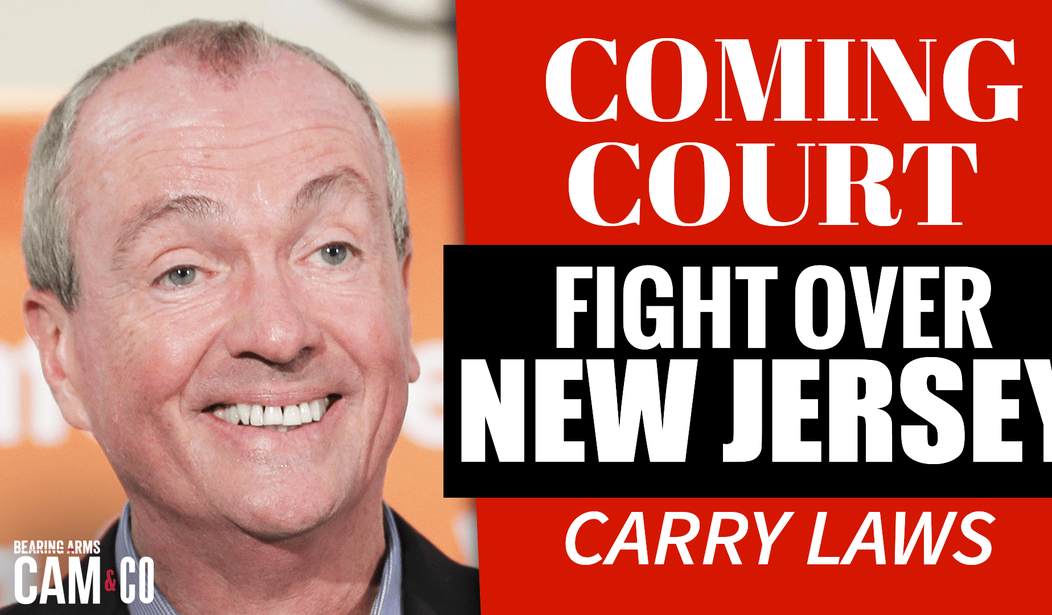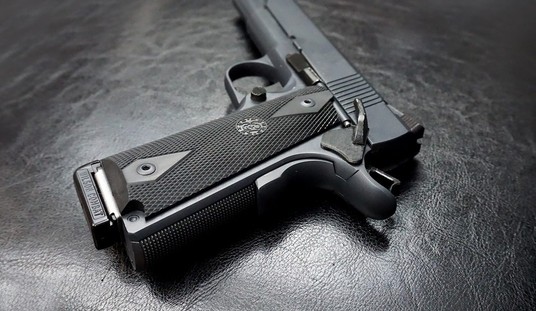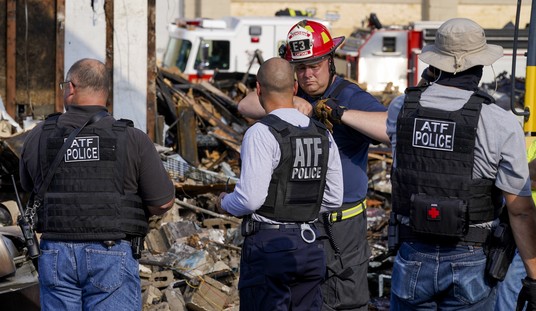A sweeping bill imposing a host of infringements on the right to bear arms is headed to New Jersey Gov. Phil Murphy for his signature, but the head of the Association of New Jersey Rifle and Pistol Clubs tells Bearing Arms’ Cam & Co that a legal challenge to the new restrictions is already in the works and will be ready to go as soon as the bill becomes law.
Scott Bach minced no words when describing what the Democrats in Trenton have done with A4769, calling it a “middle finger” to the Supreme Court and its decision in Bruen striking down “may issue” carry laws. As long as New Jersey could pick-and-choose the favored few who were given permission to bear arms in self-defense, those individuals enjoyed wide latitude in where they could carry. Now that the right is obtainable (at least in theory) to the average citizen, Bach says the legislature has made it off-limits to lawfully carry almost everywhere in the state.
“They’ve defined things like your car as not a place where you can carry,” explains Bach. “Parks, stadiums, theaters, all private property unless the owner consents… It’s over the top.”
The ban on carrying in your own vehicle is a striking example of just how far New Jersey Democrats are willing to go to give the bird to the Supreme Court majority that declared the Second Amendment protects a general right to carry a firearm for self-defense in public. Not only does A4769 ban firearms on all public transportation, under the terms of the legislation concealed carry permitholders are told they must unholster and unload their handgun and keep it in a “closed and securely fastened” case or gun safe, or store it unloaded in the locked trunk of the vehicle. And that’s just one of the many gun free zones established by the anti-civil rights legislation. Here’s the full list:
(1) a place owned, leased, or under the control of State, county or municipal government used for the purpose of government administration, including but not limited to police stations;
(2) a courthouse, courtroom, or any other premises used to conduct judicial or court administrative proceedings or functions;
(3) a State, county, or municipal correctional or juvenile justice facility, jail and any other place maintained by or for a governmental entity for the detention of criminal suspects or offenders;
(4) a State-contracted half-way house;
(5) a location being used as a polling place during the conduct of an election and places used for the storage or tabulation of ballots;
(6) within 100 feet of a place where a public gathering, demonstration or event is held for which a government permit is required, during the conduct of such gathering, demonstration or event;
(7) a school, college, university or other educational institution, and on any school bus;
(8) a child care facility, including a day care center;
(9) a nursery school, pre-school, zoo, or summer camp;
(10) a park, beach, recreation facility or area or playground owned or controlled by a State, county or local government unit, or any part of such a place, which is designated as a gun free zone by the governing authority based on considerations of public safety;
(11) youth sports events, as defined in N.J.S.5:17-1, during and immediately preceding and following the conduct of the event, except that this provision shall not apply to participants of a youth sports event which is a firearm shooting competition to which paragraph (3) of subsection b. of section 14 of P.L.1979, c.179 (C.2C:58-6.1) applies;
(12) a publicly owned or leased library or museum;
(13) a shelter for the homeless, emergency shelter for the homeless, basic center shelter program, shelter for homeless or runaway youth, children’s shelter, child care shelter, shelter for victims of domestic violence, or any shelter licensed by or under the control of the Juvenile Justice Commission or the Department of Children and Families;
(14) a community residence for persons with developmental disabilities, head injuries, or terminal illnesses, or any other residential setting licensed by the Department of Human Services or Department of Health;
(15) a bar or restaurant where alcohol is served, and any other site or facility where alcohol is sold for consumption on the premises;
(16) a Class 5 Cannabis retailer or medical cannabis dispensary, including any consumption areas licensed or permitted by the Cannabis Regulatory Commission established pursuant to section 31 of P.L.2019, c.153 (C.24:6I-24);
(17) a privately or publicly owned and operated entertainment facility within this State, including but not limited to a theater, stadium, museum, arena, racetrack or other place where performances, concerts, exhibits, games or contests are held;
(18) a casino and related facilities, including but not limited to appurtenant hotels, retail premises, restaurant and bar facilities, and entertainment and recreational venues located within the casino property;
(19) a plant or operation that produces, converts, distributes or stores energy or converts one form of energy to another;
(20) an airport or public transportation hub;
(21) a health care facility, including but not limited to a general hospital, special hospital, psychiatric hospital, public health center, diagnostic center, treatment center, rehabilitation center, extended care facility, skilled nursing home, nursing home, intermediate care facility, tuberculosis hospital, chronic disease hospital, maternity hospital, outpatient clinic, dispensary, assisted living center, home health care agency, residential treatment facility, residential health care facility, medical office, or ambulatory care facility;
(22) a facility licensed or regulated by the Department of Human Services, Department of Children and Families, or Department of Health, other than a health care facility, that provides addiction or mental health treatment or support services;
(23) a public location being used for making motion picture or television images for theatrical, commercial or educational purposes, during the time such location is being used for that purpose;
(24) private property, including but not limited to residential, commercial, industrial, agricultural, institutional or undeveloped property, unless the owner has provided express consent or has posted a sign indicating that it is permissible to carry on the premises a concealed handgun with a valid and lawfully issued permit under N.J.S.2C:58-4, provided that nothing in this paragraph shall be construed to affect the authority to keep or carry a firearm established under subsection e. of N.J.S.2C:39-6; and
(25) any other place in which the carrying of a firearm is prohibited by statute or rule or regulation promulgated by a federal or State agency.
The problems with the impending laws don’t stop with the host of “sensitive places” defined in statute. Bach also points to the increased fees for concealed carry applicants, a bizarre mandate that all concealed carry holders purchase liability insurance policies that don’t appear to be available in the state, and questionable licensing standards for applicants; all of which he says will be challenged as soon as the bill becomes law and gun owners have standing to sue.
“It’s so extreme as to reveal itself for what it is, and this is a government that thinks it’s royalty and it has its subjects,” Bach declared. “And it will not tolerate its subjects being armed. That’s what this is, and they’re going to be taught a very painful lesson that they are the servants of the people, not the masters of the people. One way or another, sooner or later, they’re going to be forced into compliance.”
Hopefully sooner rather than later, given that the law is slated to take effect immediately upon Murphy’s signature. Bach is clear-eyed, however, when looking at how the federal judiciary in the state as well as the Third Circuit Court of Appeals have treated the right to keep and bear arms in the past. He tells Bearing Arms that he isn’t expecting a federal judge to automatically grant an injunction or TRO blocking A4769 from being enforced, though the ANJRPC will be asking for both in their lawsuit. He’s much more confident about the demise of New Jersey’s impending carry restrictions once the Supreme Court gets ahold of them, though, and he made it clear that the group will try to fast track any appeals on an injunction or restraining order to get the case before SCOTUS as quickly as possible in the hopes of finally putting the right to keep and bear arms on solid ground in the Garden State.









Join the conversation as a VIP Member